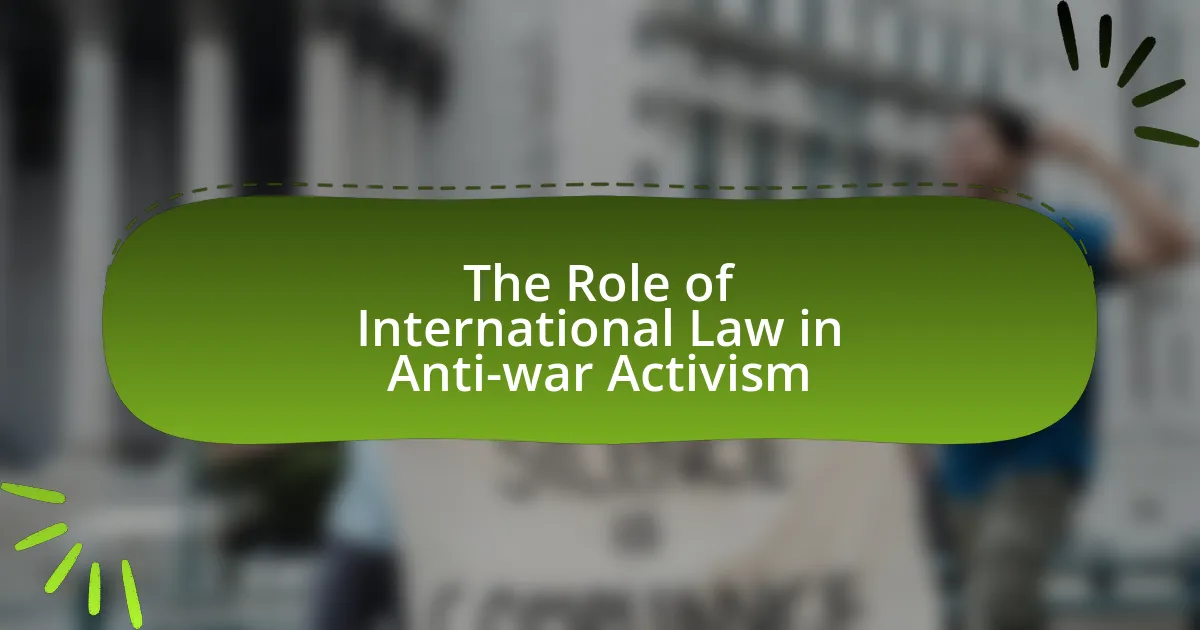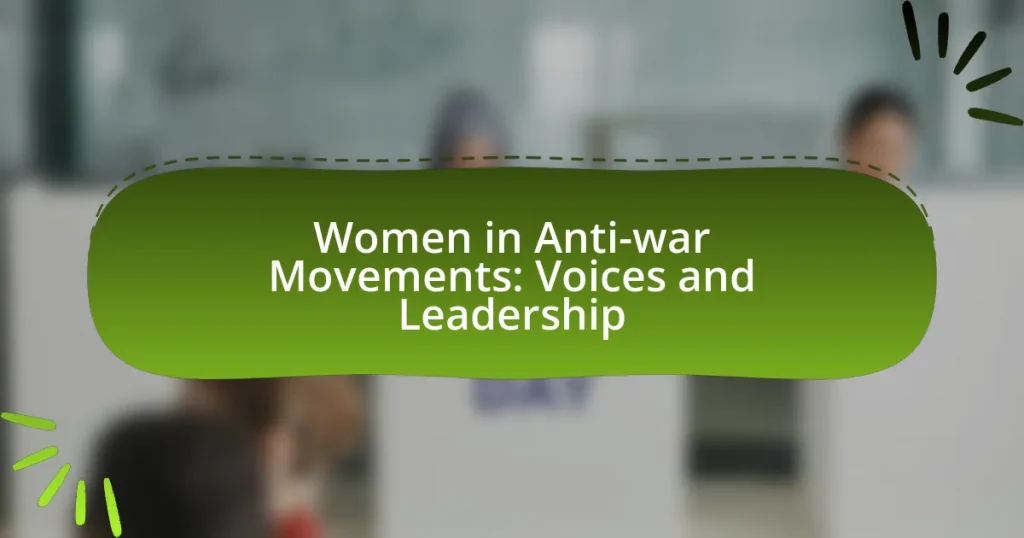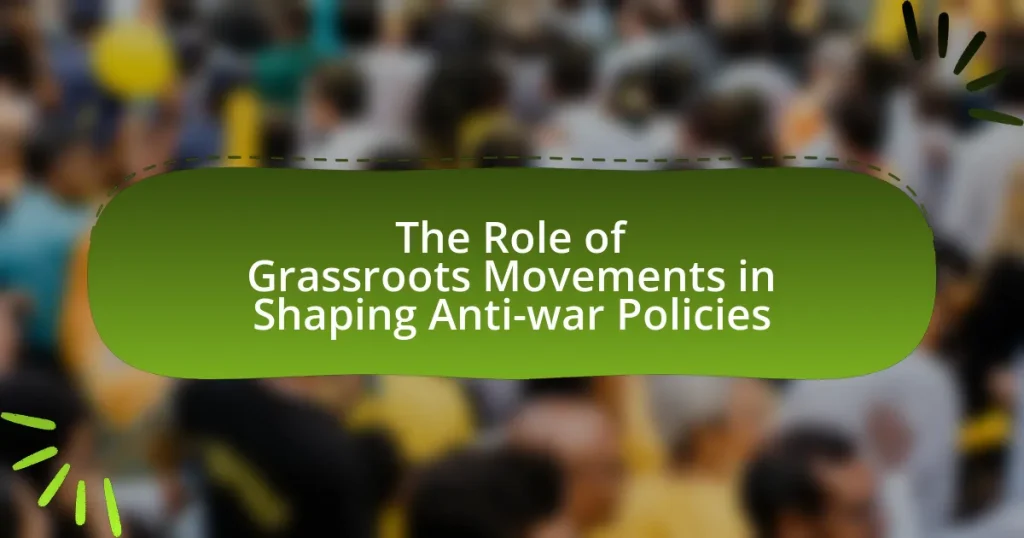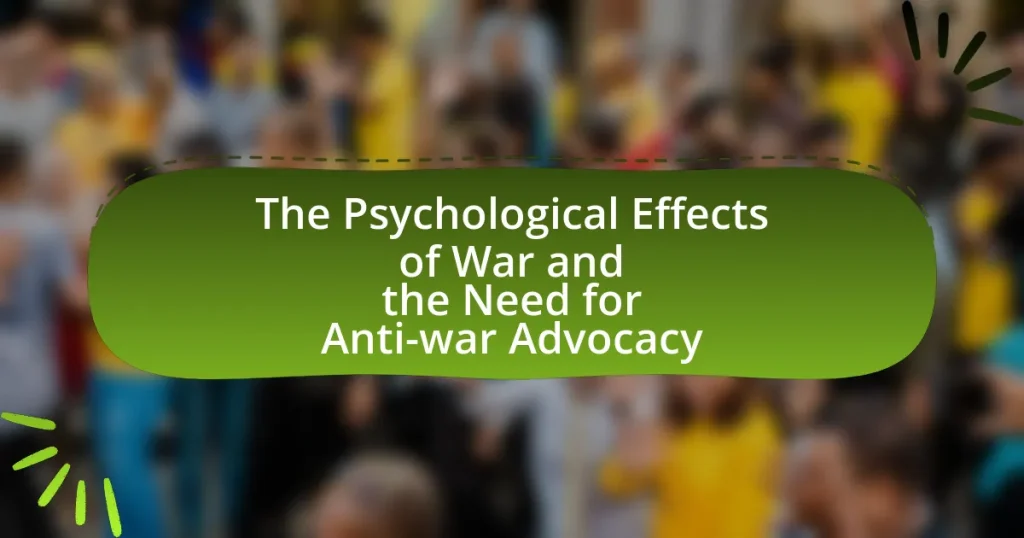The article examines the critical role of international law in anti-war activism, highlighting how legal frameworks, such as the United Nations Charter and the Geneva Conventions, provide activists with tools to challenge military actions and advocate for peace. It discusses key principles of international law relevant to anti-war efforts, including the prohibition of the use of force and the protection of human rights. The article also explores historical contexts, current challenges, and opportunities for activists to leverage international law in their campaigns, emphasizing the importance of collaboration with international organizations and the need for effective legal strategies to enhance anti-war initiatives.
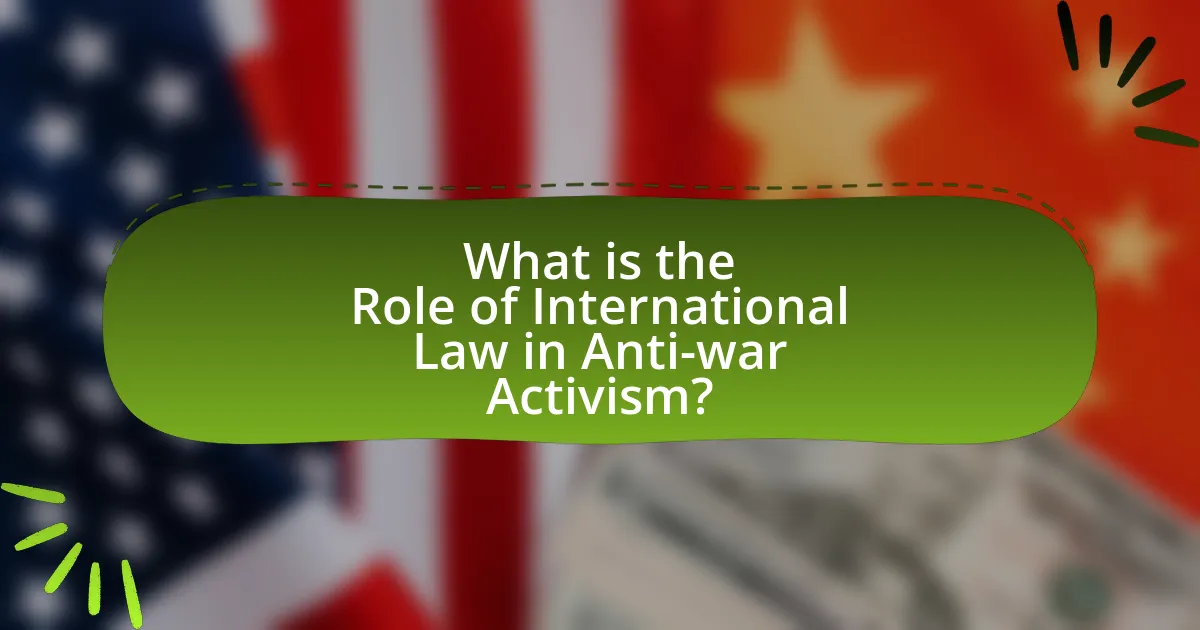
What is the Role of International Law in Anti-war Activism?
International law plays a crucial role in anti-war activism by providing a legal framework that advocates for peace and the protection of human rights. This framework includes treaties such as the United Nations Charter, which prohibits the use of force except in self-defense or with Security Council authorization. Anti-war activists leverage these legal principles to challenge military actions, arguing that violations of international law, such as unlawful aggression or war crimes, must be addressed. For instance, the International Criminal Court (ICC) prosecutes individuals for war crimes, reinforcing accountability and deterring future conflicts. Thus, international law serves as both a tool for advocacy and a basis for legal action against unjust wars.
How does International Law influence anti-war movements?
International law influences anti-war movements by providing a legal framework that activists can use to challenge military actions and advocate for peace. This framework includes treaties, conventions, and customary laws that prohibit acts of aggression and protect human rights, such as the United Nations Charter, which explicitly forbids the use of force except in self-defense or with Security Council authorization. Activists leverage these legal standards to mobilize public opinion, hold governments accountable, and seek judicial remedies in international courts, thereby reinforcing their arguments against war. For instance, the International Criminal Court prosecutes war crimes, which can deter states from engaging in unlawful military actions and empower anti-war movements to demand accountability.
What are the key principles of International Law relevant to anti-war activism?
The key principles of International Law relevant to anti-war activism include the prohibition of the use of force, the right to self-determination, and the protection of human rights. The prohibition of the use of force is enshrined in Article 2(4) of the United Nations Charter, which states that all member states must refrain from the threat or use of force against the territorial integrity or political independence of any state. The right to self-determination, recognized in the International Covenant on Civil and Political Rights, supports the ability of peoples to determine their political status and pursue their economic, social, and cultural development. Additionally, the protection of human rights, as outlined in various international treaties, underscores the obligation of states to respect and ensure the rights of individuals, particularly in conflict situations. These principles collectively provide a legal framework that anti-war activists can invoke to challenge military actions and advocate for peaceful resolutions.
How do treaties and conventions shape anti-war efforts?
Treaties and conventions shape anti-war efforts by establishing legal frameworks that promote peace and prohibit acts of aggression. For instance, the United Nations Charter, adopted in 1945, explicitly aims to prevent war through collective security measures and the promotion of peaceful dispute resolution. Additionally, treaties such as the Geneva Conventions set standards for humanitarian treatment during conflicts, thereby discouraging war by emphasizing the protection of civilians and combatants. These legal instruments create accountability mechanisms, enabling international bodies to hold violators responsible, which further deters potential aggressors.
Why is International Law important for anti-war activists?
International law is crucial for anti-war activists because it provides a framework for holding states accountable for violations of human rights and the principles of peace. This legal framework includes treaties such as the United Nations Charter, which prohibits the use of force except in self-defense or with Security Council authorization. By referencing international law, activists can advocate for the cessation of hostilities and the protection of civilians, as seen in cases like the International Criminal Court’s prosecution of war crimes. This legal basis empowers activists to challenge unjust wars and mobilize public opinion against military aggression, reinforcing the legitimacy of their cause.
What legal frameworks support anti-war activism?
Legal frameworks that support anti-war activism include international treaties, national laws, and constitutional protections. Internationally, the United Nations Charter prohibits the use of force except in self-defense or with Security Council authorization, which provides a basis for anti-war arguments. Additionally, the Geneva Conventions establish humanitarian standards during conflicts, reinforcing the need for peace. Nationally, many countries have laws that protect freedom of speech and assembly, allowing individuals to protest against war. For example, the First Amendment of the U.S. Constitution guarantees the right to free speech and peaceful assembly, which activists utilize to express anti-war sentiments. These legal frameworks collectively empower individuals and organizations to advocate against war and promote peace.
How can activists leverage International Law in their campaigns?
Activists can leverage International Law in their campaigns by utilizing treaties, conventions, and legal frameworks that protect human rights and promote peace. For instance, activists can reference the Geneva Conventions, which outline the standards for humanitarian treatment in war, to hold governments accountable for violations. Additionally, they can engage with international bodies like the International Criminal Court to bring attention to war crimes and seek justice for victims. By framing their arguments within the context of established international legal norms, activists can strengthen their claims and mobilize public support, as seen in campaigns that successfully invoked the Responsibility to Protect doctrine to advocate for intervention in humanitarian crises.
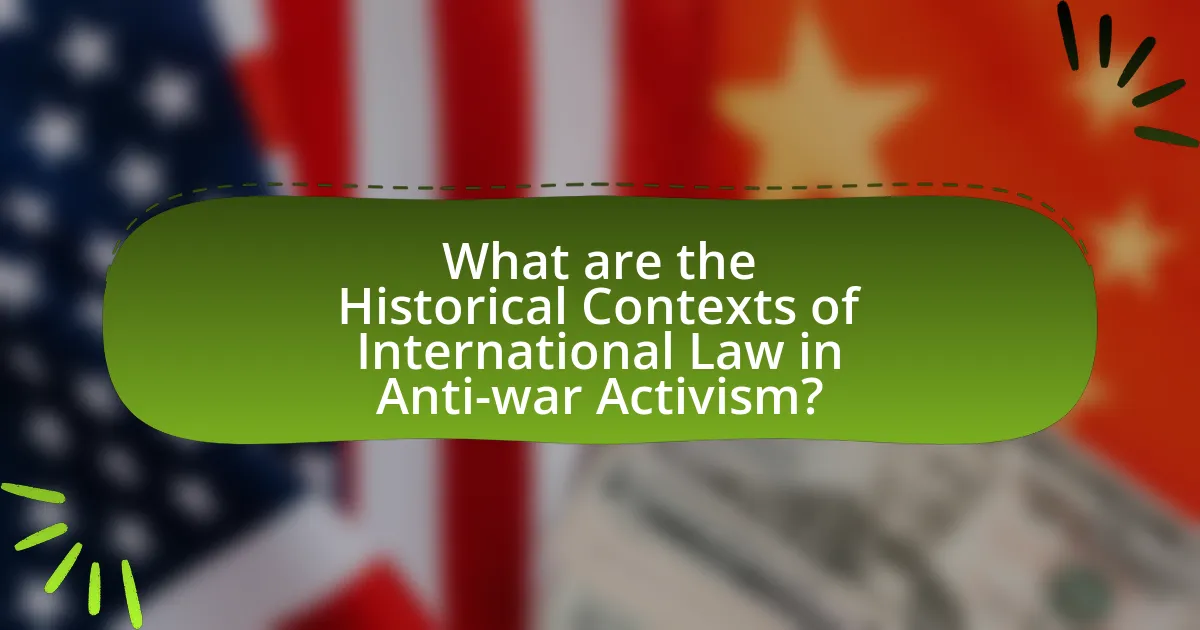
What are the Historical Contexts of International Law in Anti-war Activism?
The historical contexts of international law in anti-war activism include the establishment of legal frameworks aimed at regulating armed conflict and promoting peace. Key milestones include the Hague Conventions of 1899 and 1907, which sought to limit the means of warfare and protect civilians, and the establishment of the United Nations in 1945, which emphasized the importance of collective security and the peaceful resolution of disputes. These legal frameworks have provided a basis for anti-war activists to argue against military interventions and advocate for human rights, as seen in movements opposing the Vietnam War and the Iraq War, where activists utilized international law to challenge the legality of military actions.
How has International Law evolved in relation to war and peace?
International Law has evolved significantly in relation to war and peace, primarily through the establishment of treaties and conventions aimed at regulating armed conflict and promoting peaceful resolutions. The development of the Hague Conventions in the early 20th century set foundational principles for the conduct of war, while the United Nations Charter, adopted in 1945, emphasized the importance of collective security and the peaceful settlement of disputes. Additionally, the Geneva Conventions have established legal standards for humanitarian treatment during war, reinforcing the protection of civilians and combatants. These legal frameworks reflect a growing recognition of the need to limit the devastation of war and uphold human rights, demonstrating a shift from state sovereignty to a more collective approach to global peace and security.
What major historical events have influenced the development of International Law?
The major historical events that have influenced the development of International Law include the Peace of Westphalia in 1648, the establishment of the League of Nations after World War I, and the creation of the United Nations following World War II. The Peace of Westphalia marked the beginning of state sovereignty and the principle of non-interference, laying the groundwork for modern international relations. The League of Nations aimed to prevent conflicts through collective security and diplomacy, although it ultimately failed to prevent World War II. The United Nations, established in 1945, introduced a comprehensive framework for international cooperation, human rights, and conflict resolution, significantly shaping contemporary international law. These events collectively reflect the evolution of legal norms governing state behavior and the pursuit of peace.
How have past anti-war movements utilized International Law?
Past anti-war movements have utilized International Law primarily to challenge the legality of military actions and advocate for peace. For instance, during the Vietnam War, activists referenced the United Nations Charter, particularly Article 2(4), which prohibits the use of force against the territorial integrity or political independence of any state, to argue against U.S. involvement. Additionally, the Nuremberg Principles established post-World War II have been invoked by movements to assert that individuals, including political leaders, can be held accountable for war crimes, thereby reinforcing the legal basis for anti-war protests. These movements have effectively used legal frameworks to mobilize public opinion and influence policy decisions, demonstrating the significant role of International Law in their advocacy efforts.
What role did International Law play in significant anti-war campaigns?
International Law has played a crucial role in significant anti-war campaigns by providing a legal framework that activists use to challenge the legitimacy of military actions. For instance, the Nuremberg Trials established principles of international law that deemed aggressive war as a crime, influencing movements against conflicts such as the Vietnam War, where activists cited violations of international norms. Additionally, treaties like the Geneva Conventions have been invoked to argue against wars that result in humanitarian crises, reinforcing the legal basis for protests and advocacy against military interventions. These legal instruments empower activists to hold governments accountable and mobilize public opinion against perceived injustices in warfare.
What lessons can be learned from historical anti-war activism?
Historical anti-war activism teaches the importance of grassroots mobilization and the effectiveness of public dissent in influencing policy. For instance, the Vietnam War protests in the 1960s and 1970s demonstrated how widespread public opposition can lead to significant political change, ultimately contributing to the U.S. withdrawal from Vietnam. Additionally, the anti-nuclear movement in the 1980s highlighted the role of international law, as activists used treaties like the Nuclear Non-Proliferation Treaty to advocate for disarmament and accountability. These movements underscore that sustained activism can challenge governmental narratives and promote legal frameworks that prioritize peace over conflict.
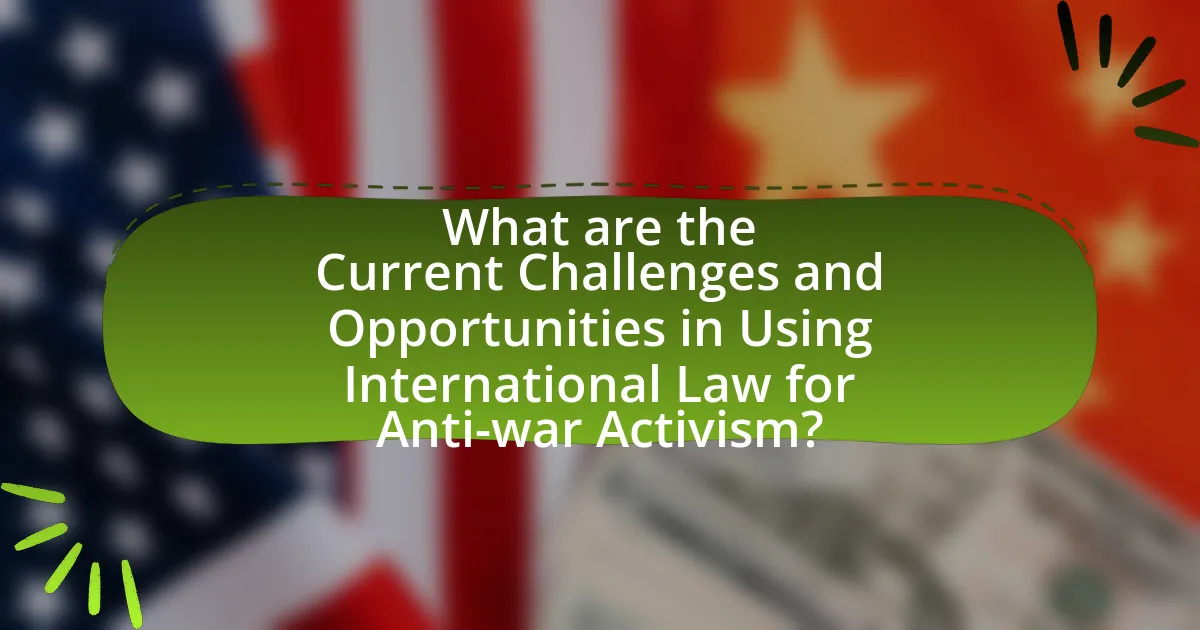
What are the Current Challenges and Opportunities in Using International Law for Anti-war Activism?
Current challenges in using international law for anti-war activism include the lack of enforcement mechanisms and the political will of states, which often prioritize national interests over legal obligations. For instance, the International Criminal Court (ICC) faces difficulties in prosecuting war crimes due to non-cooperation from powerful nations, as seen in cases involving the United States and Russia. Opportunities arise from the growing global awareness of human rights and the increasing use of international legal frameworks to mobilize public opinion and advocacy. The establishment of treaties like the Arms Trade Treaty provides a legal basis for activists to challenge arms sales that contribute to conflict, demonstrating how international law can be leveraged for anti-war efforts.
What obstacles do activists face when invoking International Law?
Activists face several obstacles when invoking International Law, primarily including lack of enforcement mechanisms, limited jurisdiction, and political resistance. The absence of a centralized authority to enforce international legal rulings often results in non-compliance by states, undermining the effectiveness of legal frameworks. Additionally, many international laws require states to consent to jurisdiction, which can limit the ability of activists to seek justice or accountability. Political resistance from governments, which may prioritize national interests over international obligations, further complicates the invocation of International Law. For instance, during conflicts, states may ignore international humanitarian laws, as seen in various instances of war crimes where accountability remains elusive due to political will.
How do political and legal barriers impact anti-war efforts?
Political and legal barriers significantly hinder anti-war efforts by restricting the ability of activists to organize, protest, and influence policy. For instance, laws that limit freedom of assembly or impose strict regulations on public demonstrations can suppress grassroots movements aimed at opposing military actions. Additionally, political factors such as government opposition to anti-war sentiments can lead to increased surveillance and intimidation of activists, discouraging public participation. Historical examples include the U.S. government’s response to anti-Vietnam War protests in the 1960s, where legal measures were employed to control dissent and maintain public order. These barriers create an environment where anti-war voices struggle to gain traction, ultimately undermining the effectiveness of their campaigns.
What are the limitations of International Law in addressing modern conflicts?
International Law has significant limitations in addressing modern conflicts, primarily due to issues of enforcement, state sovereignty, and the evolving nature of warfare. Enforcement mechanisms are often weak, as international bodies like the United Nations lack the authority to compel states to comply with resolutions, leading to selective application of laws. Additionally, the principle of state sovereignty allows nations to prioritize their interests over international obligations, often resulting in non-compliance with treaties and conventions. The rise of non-state actors and asymmetric warfare further complicates the applicability of traditional international legal frameworks, as these entities may not be bound by the same laws that govern state behavior. Historical instances, such as the inability to prevent the Rwandan Genocide despite existing international laws, illustrate these limitations in practice.
How can activists effectively use International Law today?
Activists can effectively use International Law today by leveraging treaties, conventions, and legal frameworks to advocate for human rights and accountability. For instance, activists can utilize the Geneva Conventions to highlight violations of humanitarian law during conflicts, thereby pressuring governments and organizations to adhere to international standards. Additionally, the International Criminal Court (ICC) provides a mechanism for holding individuals accountable for war crimes, which activists can invoke to seek justice for victims. The Universal Declaration of Human Rights serves as a foundational document that activists can reference to demand compliance with human rights norms globally. By strategically employing these legal instruments, activists can enhance their advocacy efforts and mobilize public support for anti-war initiatives.
What strategies can enhance the effectiveness of anti-war activism through legal channels?
Legal strategies that can enhance the effectiveness of anti-war activism include utilizing international law to challenge military actions, engaging in litigation to hold governments accountable, and mobilizing public support through legal petitions. Activists can leverage international treaties, such as the Geneva Conventions, to argue against violations of humanitarian law, thereby creating a legal basis for their claims. Additionally, successful cases like the International Court of Justice ruling against the United States for its actions in Nicaragua demonstrate how legal avenues can yield significant outcomes. By filing lawsuits and petitions, activists can raise awareness and pressure governments to adhere to international legal standards, ultimately strengthening their anti-war efforts.
How can collaboration with international organizations strengthen anti-war initiatives?
Collaboration with international organizations can strengthen anti-war initiatives by providing a unified platform for advocacy, resource sharing, and policy influence. International organizations, such as the United Nations, facilitate dialogue among member states, enabling the establishment of norms and legal frameworks that promote peace and conflict resolution. For instance, the UN’s role in mediating conflicts and promoting disarmament treaties exemplifies how collective efforts can lead to significant reductions in armed conflict. Furthermore, these organizations can mobilize funding and technical assistance for grassroots movements, enhancing their capacity to advocate against war effectively. This collaborative approach not only amplifies the voices of anti-war activists but also legitimizes their efforts on a global scale, as seen in campaigns like the International Campaign to Ban Landmines, which successfully led to the Mine Ban Treaty in 1997.
What practical steps can activists take to engage with International Law?
Activists can engage with International Law by educating themselves on relevant treaties and conventions, such as the Geneva Conventions, which govern the conduct of war and protect civilians. They can participate in advocacy campaigns that promote adherence to these laws, leveraging platforms like social media to raise awareness and mobilize public support. Additionally, activists can collaborate with legal experts to draft petitions or reports that highlight violations of International Law, thereby holding governments accountable. Engaging with international bodies, such as the United Nations, through formal complaints or by attending sessions can also amplify their voices. These steps are supported by the fact that numerous successful anti-war movements have utilized International Law to challenge military actions and promote peace, demonstrating its effectiveness as a tool for activism.
